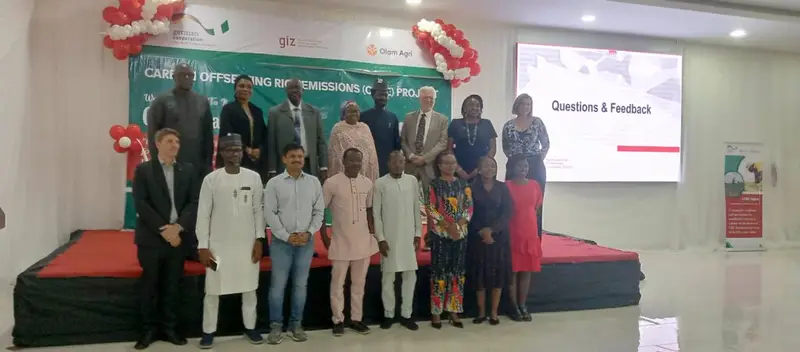German Govt. supports climate-smart rice farming in 3 states
Rice
By Felicia Imohimi
The German Government has inaugurated the Carbon Offsetting Rice Emissions (CORE) Project to support 12,000 smallholder farmers in climate-smart rice production across Benue, Nasarawa, and Kano States.
Speaking at the inauguration in Abuja, Annett Günther, German Ambassador to Nigeria, represented by Johannes Lehne, Deputy Head of Mission, highlighted the importance of the initiative.
She said the three-year pilot project, running from 2024 to 2027, aimed to lay the groundwork for a future where farmers could benefit directly from climate action.
Günther added that the project was designed to help carbon markets thrive in a way that genuinely supported sustainable development and empowered smallholder farmers.
She said the project, funded by the German Federal Ministry for Economic Cooperation and Development (BMZ), would be implemented by GIZ (Deutsche Gesellschaft für Internationale Zusammenarbeit) in collaboration with Olam Agri.
Günther explained that CORE would promote climate-smart rice cultivation practices to reduce greenhouse gas (GHG) emissions while enhancing innovation, sustainable value chains, and long-term growth in Nigeria’s rice sector.
“There is an urgent need for practical steps to reduce emissions and strengthen the resilience of agriculture, given the escalating impacts of climate change,” she said.
Günther reaffirmed Germany’s commitment to climate finance, noting that in 2023, the German Government contributed 9.94 billion euro, leveraging public funds to attract private climate finance through revolving credit lines, structured funds, and public-private partnerships.
She added that BMZ, in partnership with the Bill & Melinda Gates Foundation and the European Union, had committed 117 million euro to its current agricultural portfolio in Nigeria and the ECOWAS region.
“The funding aims to transform Nigeria’s agri-food system by boosting food security, employment, inclusive growth, and climate resilience.”
Alexis Brakhan, GIZ Implementation Manager for the CORE Project, explained that the initiative would promote alternate wetting and drying, as well as the use of biochar to improve soil health and reduce emissions.
“CORE is building a high-quality carbon initiative that links sustainable farming to carbon markets. It offers a scalable model for transforming agri-food systems,” he said.
Paul Nicholson, Senior Vice President of Rice at Olam Agri, described the project as a demonstration of the company’s commitment to food security and environmental sustainability.
“Carbon credits give farmers a stake in climate action, rewarding their adoption of climate-smart agriculture,” Nicholson said.
Olamide Fagbuji, Senior Special Assistant to the President on Climate Change, highlighted the urgency of the initiative, noting that Nigeria loses around 100 million dollars annually to climate-related flooding.
He also pointed out that rice, the country’s staple crop, was one of the most climate-vulnerable.
Fagbuji stated that agriculture accounted for 25 per cent of Nigeria’s GDP but contributed 33 per cent of national GHG emissions, primarily due to methane from rice paddies.
“Without innovation, the twin challenges of food insecurity and rising emissions will only intensify. That’s why the CORE project is vital,” he said.
He emphasised the importance of alternate wetting and drying, improved seed varieties, and low-emission irrigation methods, which could reduce methane emissions, improve yields, conserve water, and empower rural communities.
Fagbuji urged both public and private stakeholders to invest in climate-smart agriculture and scale the CORE model across Nigeria’s rice-producing regions. (NAN)(www.nannews.ng)
Edited by Abiemwense Moru






